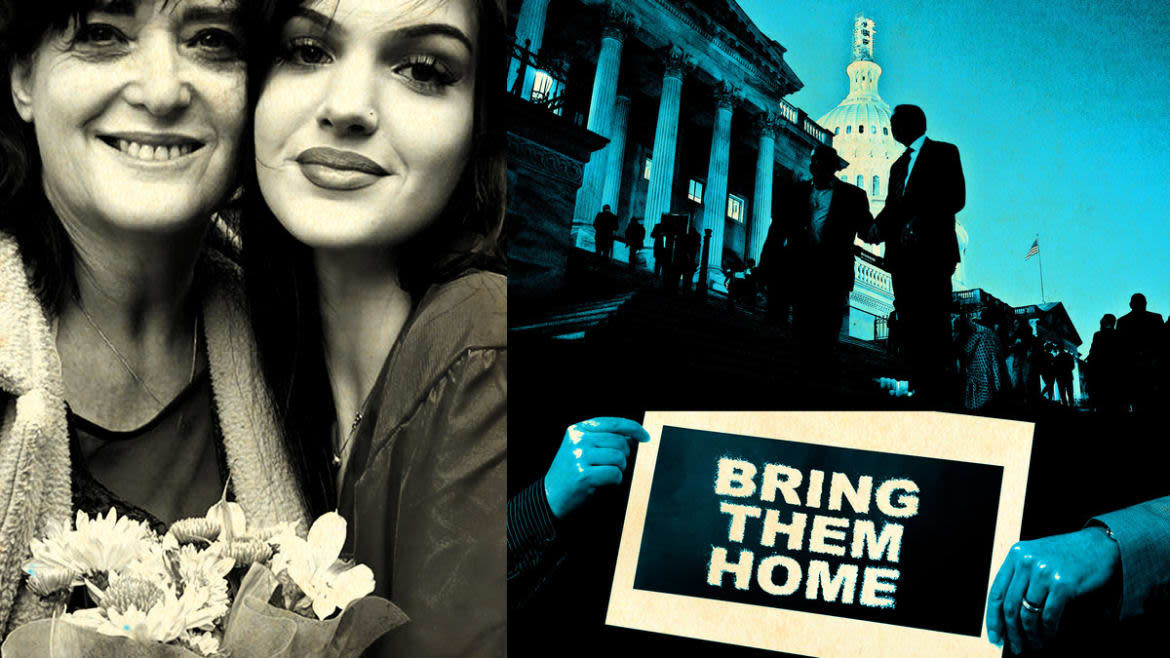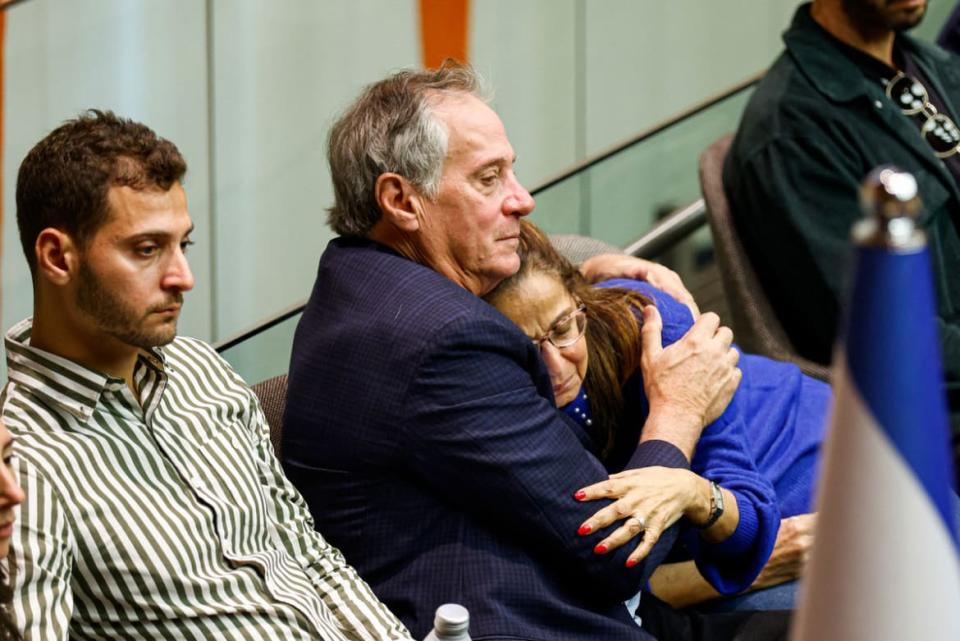Inside the Risky Mission to Rescue Hostages From Hamas

- Oops!Something went wrong.Please try again later.
As the fate of dozens of civilians held hostage by Hamas gunmen hangs in the balance in the Gaza Strip, experts say the rescue operations that will be undertaken to save the captives will likely be just as unprecedented as the mass hostage-taking in Israel—and inevitably very messy.
“This is absolutely unprecedented… You have something like 150 people that are being held as human shields,” said Jeffrey Feltman, a former Assistant Secretary of State for Near Eastern Affairs who also previously served in Jerusalem and Tel Aviv.
“I don’t think that governments have much experience in dealing with the type of of hostage-taking that we’re seeing in the Gaza Strip right now,” Feltman told The Daily Beast.
Even in the desperation and pain that has filled homes around the world as so many remain missing or suspected taken hostage, progress is slow, and many questions remain unanswered, at times forcing family members to try to take action themselves.
The Israeli embassy in Washington, D.C. said it has little information on hostages that it is sharing publicly at this time.
“We have very little information for you about the hostages at the moment given the volatility and sensitivity of the situation,” an Israeli Embassy spokesperson told The Daily Beast.
The Biden administration has said that Hamas is holding some Americans hostage, but has admitted that it doesn’t have full clarity on how many there may be, where they are, or if they are being moved, and how often. In all, 14 Americans remain missing following the attacks, White House National Security Council Coordinator John Kirby told reporters Friday.
The Israeli government has been in touch with some about the status of their loved ones. Judith and Natalie Raanan, from Evanston, Illinois, just outside Chicago, were visiting relatives in a kibbutz near the Israel-Gaza border and went missing Saturday when Hamas first attacked. The family of Judith, 59, and Natalie, 17, has been waiting for news all week, and was informed that they are indeed being held hostage, Uri Raanan, Natalie’s father, said Friday.

Natalie Raanan
The Israeli government informed Uri of their status after they had been in touch with officials from both Israel and the United States, Rabbi Meir Hecht of Chabad of Evanston told The Daily Beast.
“I’m in touch with the family and the family of course is in touch with officials, American officials and Israeli officials,” Hecht told The Daily Beast, adding that there was not a lot of available information about hostage negotiations or the condition of the hostages in general.
The lack of information has been incredibly difficult for the family, Hecht said.
“It’s definitely very frustrating for the family and painful—devastating beyond words—to have to be waiting for just basic information about your loved ones, whether they’re alive or taken hostage,” Hecht said. “The family and the community are all asking everyone to make a prayer. And we know that the power of goodness and light can and will win against the forces of evil and hatred.”
For Hamas, that uncertainty may be the entire point, Phil Andrew, co-founder of Pax Group and a former FBI hostage negotiator, told The Daily Beast.
“This is a continued attempt to terrorize a population and create fear and pain and confusion,” Andrew said.
That terror has played out this week for many families, who have spent days waiting for news about their loved ones who are unaccounted for and believed to be held hostage. Some have been waiting up only to receive the devastating news that their loved one is not a hostage, but has in fact been killed, The Daily Beast has learned.
Nahar Neta said he last heard from his mother, California native Adrienne Neta, 66, when she was sitting on her porch in Israel and talking on the phone with her children when Hamas came to her kibbutz Saturday.
Nahar had suspected she was missing or held hostage, but the Israeli government confirmed she had died on Wednesday. Nahar Neta shared the news with The Daily Beast on Thursday.
All hands on deck
The Biden administration is keeping quiet on whether U.S. officials have been able to communicate with Hamas, either directly or through alternative channels, on the status of the hostages.
“We’re casting the net wide,” White House National Security Council Coordinator John Kirby told reporters Wednesday, adding that the United States is in discussions with Israel about how to negotiate over the hostages. “When we’re talking about getting Americans home overseas, that have been held hostage or wrongfully detained, the less you say out there publicly the better.”
The United States is also working on securing the release of hostages by working with the government of Qatar, U.S. Secretary of State Antony Blinken said Friday.
“We’re… working intensively together to secure the release of hostages, including Americans, being held by Hamas in Gaza,” Blinken said in Doha, the capital of Qatar.
U.S. officials have also been reaching out to other diplomats and contacts in the region to try to gain any in with Hamas to help bring the hostages home, a State Department official told The Daily Beast.
“So much of this happened so quickly. It’s been all hands on deck,” the official told The Daily Beast.

Rachel Zeitchik (R) and Jay Zeitchik during a meeting with families of Israelis kidnapped by Hamas, at UN headquarters in New York City on Oct. 13, 2023.
“When we heard that there were Americans missing, unaccounted for, potentially as hostages, we tried to get fidelity on that,” the State Department official said, adding that they were also reaching out to families to gather information. “At the same time, we… reached out to our contacts in the region, like other diplomats, to see where they could be useful for getting the release of anyone who is unaccounted for.”
The Biden administration is sending experts to advise and help with hostage recovery efforts in the meantime, President Joe Biden said Wednesday.
Other questions abound. The Biden administration is still working on locating where the hostages are.
“Where they are and in what condition, no, sadly we don’t know. And that makes efforts very very difficult,” Kirby told reporters.
The U.S. government believes there are a “handful” of Americans held hostage, but Kirby admitted that number may grow as the government gathers more information.
“We all need to steel ourselves for the very distinct possibility that these numbers will keep increasing and that we may in fact find out that more Americans are part of the hostage pool,” Kirby said.
“We’re working at this literally around the clock to try to find out as much as we can about where they are and in what conditions they’re being held,” Kirby told reporters Friday in an update. “That’s the first thing that you got to do to be able to come up with policy options and alternatives to try to get them home with their families.”
Hamas has said that some Israeli prisoners are in tunnels under Gaza, while others are located throughout Gaza, The Wall Street Journal reported.
The path ahead for bringing the hostages home is incredibly complex, given that several countries’ governments are involved with different policies and priorities for hostages, experts warn. As Israel continues to bomb Gaza, and signals a ground invasion is coming, the possibility that some hostages may be killed in the process looms. And the fact that the number of hostages is so high and that they are likely dispersed also poses several challenges, as Feltman noted.
“Even if you look at things like plane hijacking, those people are all together, these people in Gaza have most likely been dispersed… around the Gaza Strip, a very densely populated urban area,” Feltman told The Daily Beast.
And yet, if different members of Hamas are in charge of hostages in different locations, it may provide different opportunities to bring them home safely, particularly since Hamas and its members can be fragmented in their motivations, former hostage negotiators said.
“There are lots of different kinds of motivations,” Andrew said. “An individual hostage taker might see it as an opportunity to make money or save their own life or get something that they have an interest in that may not be part of the overall strategy of Hamas.”
“It’s important to take these individually,” Andrew said, warning families that some hostages’ cases could progress in different ways than others. “Because where a hostage is and who the actual front person is that has control over them and their individual motivations might evolve as this operational environment changes.”
Efforts to gather more information will likely be paired with an assessment of risk of violence from the hostage takers, according to Dr. Nancy Zarse, who has worked as a consultant to the FBI’s Countering Violent Extremism section and who has led hostage negotiation teams.
“Part of what you’re looking at there is has there been previous violence because… the single greatest indicator of future behavior is past,” Zarse said, adding that the frequency, recency, and severity of violence ought to be assessed. In this case, Hamas’ violence is recent, and “the severity of the violence is significant… so you’ve got an elevated risk of danger to those hostages,” Zarse told The Daily Beast.
Waking nightmare
While the governments work to piece together where hostages are, some families with loved ones who are suspected to be held hostage haven’t heard from their governments at all, said Josh Drill, a coordinator for the Israel Pro Democracy Movement.
For them, the lack of information is a signal that if they want something done, they have to do it themselves, Drill said. Some have kicked into high gear and are taking matters into their own hands, working contacts of contacts, calling up media outlets, and trying to get the word out about their loved ones.
Drill and his teammates have jumped into action to help families feel like they are doing everything they can to get their loved ones home, and have launched a communication network to connect families with the media to help tell their stories.
“The second the war started, we understood that we need to do what we can with our resources and energy to help the Israeli people,” Drill told The Daily Beast.
“A family that has a family member who’s abducted—they want to feel that they’re able to push things forward and that they’re doing something to bring that person back. And one thing that they’re able to do… is bring in media and bring in the international media to get these faces and get these stories out,” Drill said.

Judith Raanan
The impulse to speak to the press about a loved one held hostage is very common, and one that can help in some cases, said Daren Nair, a security consultant who has helped family members of those taken hostage abroad, including Richard Ratcliffe, the husband of Nazanin Zaghari-Ratcliffe, who was released last year after being detained in Iran for six years.
But for families that are starting to feel desperate, or may feel more desperate in the days ahead as uncertainty bears down, Nair warned against trusting third parties promising to act as liaison with Hamas without vetting them carefully.
“Beware of scams,” Nair told The Daily Beast. “I’ve known families who have been approached by people saying that they know some people who can help your loved one. All they need is a payment to facilitate their release. These are almost always scams.”
Despite the absence of more information, the Biden administration has made efforts to stand with families of those missing or taken hostage. Blinken met late this week with families who have loved ones missing. Biden, along with other administration officials, including Roger Carstens, Biden’s envoy for hostage affairs, spoke on a call with families who have loved ones taken hostage this week.
“The president conveyed directly to these families that they have been in his prayers and reaffirmed for them that the United States government is doing everything possible to locate and bring home their loved ones,” Kirby said.
U.S. Secretary of Defense Lloyd Austin called out to the families during a visit to Tel Aviv on Friday.
“We will continue to coordinate closely with Israel to help secure the release of the innocent men, women and children in the clutches of Hamas, including American citizens,” Austin said following a meeting with Israeli defense minister Yoav Gallant. “I’m… here in solidarity with all the families still living the waking nightmare of not knowing the fate of their loved ones.”
Deal with the devil
No one knows how the release of any hostages will be secured. Hamas has started to try to gain concessions from Israel, and has requested the release of thousands of Palestinian prisoners in Israel in exchange for Israeli captives, The Wall Street Journal reported.
It has been a long-held belief that the IDF does not leave its soldiers behind and Israel, in the past, has made concessions to recover hostages. In 2011, the Israeli government opted to trade Staff Sgt. Gilad Schalit after more than five years of Hamas captivity for 1,000 Palestinian prisoners, for instance.
That is an indication that Israel may be willing to do so again, said Zarse.
At this stage, Hamas may view the hostage situation as a net benefit to its cause, no matter what the outcome, Feltman said.
“I don’t believe that Hamas at this moment probably has any interest in negotiations,” Feltman said.
“From Hamas’ perspective, this war crime is basically a win-win situation: That either at some point, they’re able to achieve the release of Palestinian prisoners… Or, the Israelis moderate their response plans for Gaza because they know there’s hostages there,” said Feltman, now a member of the Commission on Hostage-Taking and Wrongful Detentions at the Center for Strategic and International Studies.
First Responders Recount the Horror of Hamas’ Slaughter
Even if the Israelis don’t moderate their plans, Hamas can point the finger at Israel for attacks, Feltman said.
“In any of those cases, Hamas gets a win for their war crimes,” Feltman said.
For now, the governments working on hostage recovery need to explore every possible avenue for making a deal with Hamas to bring the hostages home, said Andrew—including by potentially unfreezing $6 billion the United States and Qatar have held back from Iran in recent days following Hamas’ attacks in Israel.
“Everything needs to be on the table there,” Andrew told The Daily Beast.
U.S. officials and Qatari government officials have put a hold on allowing Iran to access a $6 billion account for humanitarian aid. The move came after lawmakers on Capitol Hill accused the Biden administration of potentially helping fuel the fire behind Hamas’ attack, given Iran’s military support for Hamas. The funds were going to be released following a prisoner exchange deal made with Iran last month.
The White House has said that all of those funds remain in a Qatari bank, not in Tehran’s hands.
Israeli Energy Minister Katz has said that the siege on Gaza Strip will not end and no humanitarian aid will flow to Gaza until Israeli hostages are released.
“Humanitarian aid to Gaza? No electrical switch will be turned on, no water hydrant will be opened and no fuel truck will enter until the Israeli abductees are returned home,” Katz wrote on X on Thursday.
U.S. leaders through the years have said it’s never a good idea to negotiate with terrorists, for fear of legitimizing their power or leading to more violence, but then reverse course when push comes to shove. Here, too, leaders would do well to allow concessions to pave the way forward for a safe return of hostages, said Nair.
“Israel has shown they are willing to give up concessions. And giving up concessions is the right thing to do to prioritize the life of your hostage. Because you can always punish the hostage takers tomorrow, the day after, next month, next year, but you cannot bring a dead hostage back to life,” Nair told The Daily Beast.
Hamas has threatened to execute hostages each time Israel bombs Gaza. Hamas has not yet publicly followed through on the threat, even as Israel continues its onslaught.
Some harbor concerns that negotiations may not go very far, since negotiating with a terrorist organization like Hamas will likely be difficult given their ideological aims, Hecht, the rabbi from Evanston, suggested.
“The lines are clear: Hamas is a terrorist organization that wants the death of every Jew and the death of Israel,” Hecht said. “So it is very hard to negotiate when it’s a zero sum game. All they want is Israel gone.”
In the dark
While families may want to speak up now and take action, as negotiations progress, the governments involved may prefer to keep their own counsel, and may even not tell families everything they know about the hostages. It’s a reality families must prepare for, warned Zarse.
“They’re not going to tell us much because they can’t. They run the risk that if they say something to a family member, the family member puts it on social media and Hamas sees it. They can’t afford to jeopardize negotiations or possible tactical planning, and so they deliberately keep the families, somewhat in the dark,” Zarse said.
“This is a point at which we really ask for families to have a little bit of faith and to trust that the professionals are doing their best.”
The White House cautioned Friday that not a lot of information will be made public moving forward on negotiations.
“As things move along here, we’re going to be sufficiently prudent in the kinds of information that we talk about publicly lest we actually jeopardize the effort to get these hostages released and back home safely,” Kirby said on a call with reporters Friday.
And though it will be difficult, families may need to brace themselves for being uncertain about their loved ones’ futures for longer, warned Nair.
“This could be resolved within a few days, or… it could take years. So it might be a sprint, it might be a marathon,” Nair said. “But I would tell families to prepare for a marathon.”
Get the Daily Beast's biggest scoops and scandals delivered right to your inbox. Sign up now.
Stay informed and gain unlimited access to the Daily Beast's unmatched reporting. Subscribe now.

